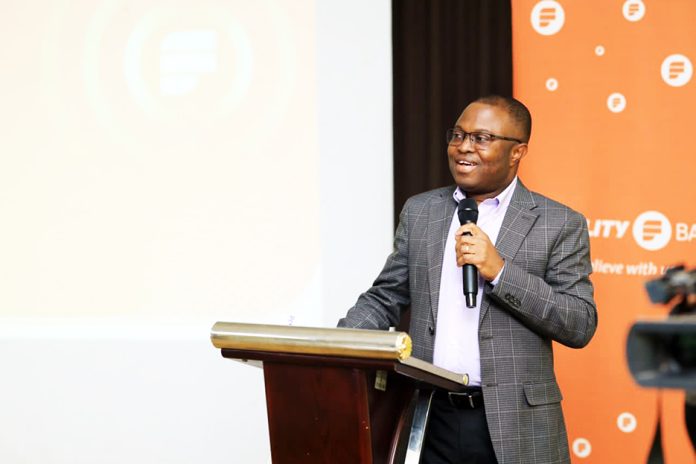Fidelity Bank Ghana, with over 80 branches in Ghana, since its inception in 1998, has affirmed its status as one of the major institutions, having made a profit of GH¢1.17 billion in 2023.
The feat is coming on the heels of a huge loss of GH¢518 million in 2022, following an aggressive debt restructuring plan announced by the Ghanaian government, which brought unprecedented challenges.
The Deputy Managing Director of the Bank, Mr. Atta Yeboah Gyan, interacting with media practitioners in Kumasi on Friday, August 16, 2024 noted that the bank has, however, emerged stronger against the restructuring exercise and attributed its strength to resilience of products and effective risk management qualities and digital innovation at the core of its strategy.
Sharing the bank’s vision and success story towards a sustainable future at the forum, Mr. Gyan announced that the vision is to make Fidelity Bank a household name and impact the Ghanaian economy.
He disclosed that Fidelity Bank is the largest privately-owned Ghanaian bank and the fifth largest bank in Ghana, in terms of assets, with total assets standing at GH¢17.22 billion at a 25% growth.
The shareholder funds increased by 119% at GH¢1.44 billion, while the capital adequacy ratio (CAR) also improved from 16.8% in 2022 to 20.9% in 2023, following a strong capitalisation.
He stressed that the bank’s achievement is not just a testament to growth but also to its commitment to serving the people of Ghana.
As a result, Fidelity Bank has expanded financial access across Ghana and opened 81 branches, including 16 in Ashanti region, in a bid to bring banking closer to its customers.
He said the bank’s innovative Smart Account and extensive agency network, which boasts of over 6,000 agents nationwide, have empowered over 1.5 million people and thus driven deposit growth to over GH¢500 million.
The Deputy MD mentioned also that the bank’s WhatsApp banking assistant, Kukua, has revolutionised customer interactions to serve over 200,000 users and offered a range of services from account opening to bill payments.
The bank, Mr. Gyan said, has made a significant impact in agriculture, which holds immense potential for the economy of Ghana and is, therefore, poised to ensure that this sector reaches its full potential and for which it recently launched the GreenTech Innovation Challenge (GTIC), a significant initiative aimed at propelling Ghana’s agricultural sector towards a more sustainable future.
He said through GTIC, an extension of the Fidelity Young Entrepreneurs Initiative, the bank will award over GH¢1 million in grant funding to support innovative solutions addressing critical challenges within the country’s agricultural value chain.
The bank has, through its partnership with the MasterCard Foundation, launched the Bridge-In-Agriculture initiative, which focusses on supporting women entrepreneurs in the agricultural sector. Since the beginning of 2024, this initiative has created 119 new jobs sustained 3,209 existing jobs and positively impacted 2,483 smallholder farmers, of which 72.9% of the beneficiaries are women.
Another area where the bank has made major strides, Mr. Gyan said, is the bank’s Corporate Social Responsibility (CSR) initiatives, which are centered around education, economic empowerment, health, gender equality, and climate change in line with the Sustainable Development Growths under which the bank has impacted the lives of 6,409 individuals, with a balanced representation of both men and women in 2024, with a total CSR spend for the year amounting to GH¢1.1 million.
According to him, the bank planned to impact 15 schools in the next 5 years since 2022 with infrastructure and non-infrastructure support nationwide to which it has expanded to include Abbeykope D/A Basic School and Nyameyekrom D/A Primary, joining the list of schools like Mamprobi Ebenezer 4, Douse D/A School, Okogyeasuo M/A JHS in the Ashanti region, and FodomeKodzeto MA School that have already benefited from our orange impact initiative.









